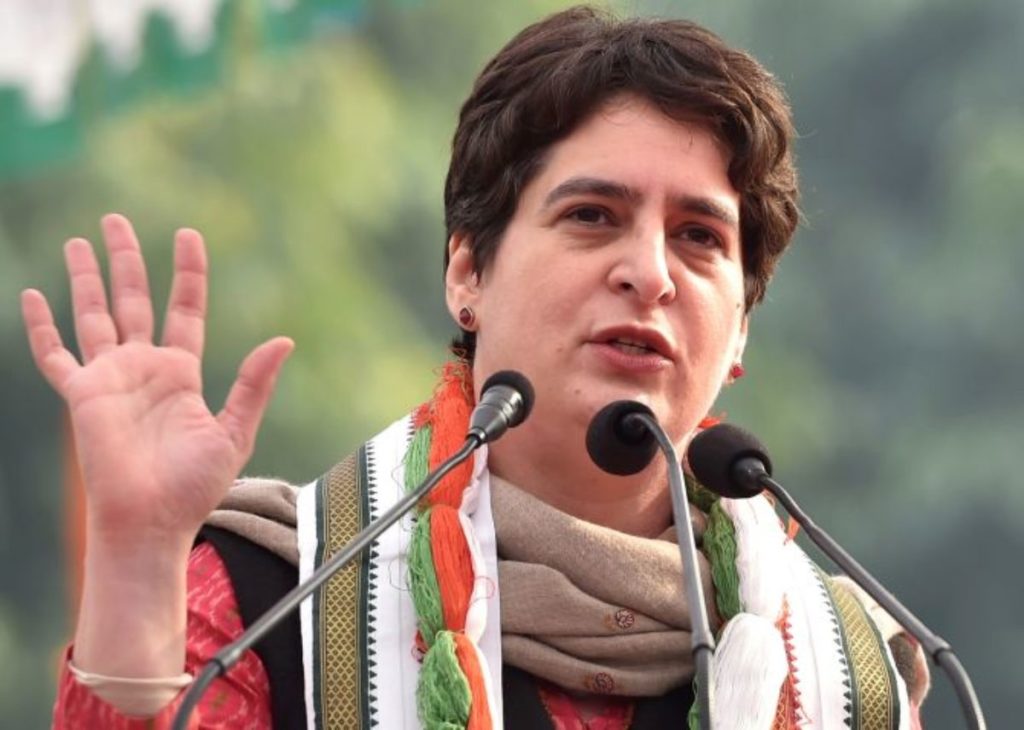“Shame On Govts Supporting Destruction…”
Nov 14, 2023 | Pratirodh Bureau
The Congress leader alleged that today coal, electricity, ports and airports of the country are all with the friends of the prime minister
On Monday, Congress leader Priyanka Gandhi Vadra hit out at the international community over the death of 10,000 people, including 5,000 children, in the Israel-Hamas conflict in Gaza. She said there appeared to be no shock to the conscience of those supporting the genocide.
“What a deplorable and disgraceful milestone…over 10,000 people killed in Gaza of which almost half are children. One child is being killed every ten minutes according to the WHO, and now tiny babies had to be removed from their incubators due to lack of oxygen and were left to die,” Priyanka Gandhi, who is the Congress general secretary, said in a post on X.
“Still, no shock to the conscience of those supporting this genocide, no ceasefire… just more bombs, more violence, more killings and more suffering. Shame on the governments supporting this destruction. When is it going to be enough?,” she asked, while hitting out at the international community.
Priyanka Gandhi’s remarks came after more than 10,000 people have been killed in Gaza since Israel launched its military offensive over a month ago.
Earlier too, Priyanka Gandhi had said that she was “shocked and ashamed” that India has abstained from voting for a ceasefire in Gaza.
The Israeli–Palestinian conflict is an ongoing military and political conflict in the Levant. Beginning in the mid-20th century, it is one of the world’s longest continuing conflicts. Various attempts have been made to resolve the conflict as part of the Israeli–Palestinian peace process, alongside other efforts to resolve the broader Arab–Israeli conflict.
Public declarations of the desire to see a Jewish homeland established in Palestine, including the First Zionist Congress of 1897 and the Balfour Declaration of 1917, created early tensions in the region after waves of Jewish immigration. Following World War I, the Mandate for Palestine included a binding obligation for the “establishment in Palestine of a national home for the Jewish people”.
Tensions grew into open sectarian conflict between Jews and Arabs. The 1947 United Nations Partition Plan for Palestine was never implemented and provoked the 1947–1949 Palestine War. The current Israeli-Palestinian status quo began following Israeli military occupation of the West Bank and Gaza, known as the Palestinian territories, in the 1967 Six-Day War.
Progress was made towards a two-state solution with the Oslo Accords of 1993–1995. Final status issues include the status of Jerusalem, Israeli settlements, borders, security and water rights as well as Palestinian freedom of movement and the Palestinian right of return.
The violence of the conflict in the region — rich in sites of historic, cultural, and religious interest worldwide — has been the subject of numerous international conferences dealing with historic rights, security issues, and human rights, and has been a factor limiting access to, and tourism in, areas that are highly contested. The majority of peace efforts have been centred around the two-state solution, which involves the establishment of an independent Palestinian state alongside Israel. Public support for a two-state solution, which formerly enjoyed support from both Israeli Jews and Palestinians, has dwindled in recent years.
Within Israeli and Palestinian society, the conflict generates a wide variety of views and opinions, with some even claiming that the violence perpetrated by the Israelis against the Palestinians is part of a genocide, while others claim Palestinians use worldwide terrorism to promote their interests.
Since its inception, the conflict’s casualties have not been restricted to combatants, with a large number of civilian fatalities on both sides. A minority of Jewish Israelis (32 percent) support a two-state solution with the Palestinians. Israeli Jews are divided along ideological lines, and many favor maintaining the status quo.
Approximately 60 percent of Palestinians (77% in the Gaza Strip and 46% in the West Bank), support armed attacks against Israelis within Israel as a means of ending the occupation, while 70% believe that a two-state solution is no longer practical or possible as a result of the expansion of Israeli settlements.
